15 Unwritten Campground Etiquette Rules for (New) RVers
You’ve got the RV, the gear, and a killer route mapped out. You’re ready to hit the road… or are you?
In fact, you’ve probably already read the campground’s posted rules: quiet hours, pet policies, fire safety, blah blah blah.
But no one hands you the unwritten and unspoken rules of RV parks. The ones that seasoned RVers follow to keep campground life smooth, safe, and a little less annoying for everyone.
We’ve camped all over the US, from boondocking sites to resort-style parks with wine tastings and lazy rivers. RV life offers incredible freedom and access to places most people only dream of and if you’re curious why we were obsessed enough to go full-time, here are our top 10 reasons why an RV is the best way to travel.
Along the way, we’ve learned exactly what makes someone a “great neighbor” versus “that camper“. This list isn’t about nitpicking; it’s about helping first-time RVers ease into campground life without stepping on toes (or sewer hoses).
Let’s walk through the real-world RV campground etiquette that will help keep your trip drama-free from check-in all the way to the dump station.
1. Respect Quiet Hours (and Your Volume Before Then)
Most campgrounds have quiet hours (usually between 10 pm and 8am), but here’s the truth: even before those hours kick in you can still be the noisy neighbor no one wants.
Keep your outdoor TVs, speakers, and campfire stories at a considerate volume. RV walls are notoriously thin, so even if it seems reasonable to you, your neighbor might be catching every word of your crime podcast while trying to enjoy the sound of crickets.
Most campgrounds have quiet hours (usually between 10 pm and 8am), but here’s the truth: even before those hours kick in you can still be the noisy neighbor no one wants.
Keep your outdoor TVs, speakers, and campfire stories at a considerate volume. RV walls are notoriously thin, so even if it seems reasonable to you, your neighbor might be catching every word of your crime podcast while trying to enjoy the sound of crickets.

Morgan might occasionally get carried away cheering the Dawgs though…
We’ve camped next to folks watching action movies outside with surround sound… at 9:45 p.m. Technically not breaking the rules but definitely killing the vibe.
2. Don’t Walk Through Occupied Sites
This one is a campground classic but somehow it still gets violated way too often. Just like you wouldn’t cut across someone’s front yard in a neighborhood, you shouldn’t walk through an occupied campsite.
Even if it’s the shortest path to the bathhouse, the lake, or the trash bin, take the long way. Those couple of extra steps show a whole lot of respect for your fellow camper’s space.
Some folks don’t mind if you cut across a vacant spot (we’re usually okay with it, too). But it can still be risky: someone may have that site reserved. If in doubt, go around.
We’ve even seen kids darting between rigs and picnic tables with no supervision. That’s not just rude, it’s potentially dangerous. Slide-outs, grill flames, and dog leashes don’t mix well with unexpected visitors.
Bottom line: treat each site like someone’s weekend home… because it is.
3. Handle Sewer Hoses the Right Way
This might be the most stomach-turning offense we’ve seen at a campground… and sadly, it’s more common than you’d think.
Here’s the deal: never use a fresh water spigot to flush your sewer hose. That’s an easy way to contaminate the water supply and make enemies out of your neighbors. Use a designated sewer rinse if the campground provides one, and always use a separate, clearly marked hose just for flushing your tanks.
And please, for the love of nature and your neighbor’s appetite, do not place your sewer hose on the picnic table or anywhere people eat, sit, or cook. Yes, we’ve actually seen this happen… more than once. 💩
Treat your tank routine like a backstage job: efficient, clean, and behind the scenes.
4. The Fire Pit Is Not a Trash Can
You’d be surprised how many people treat the fire ring like a dumpster with flames.
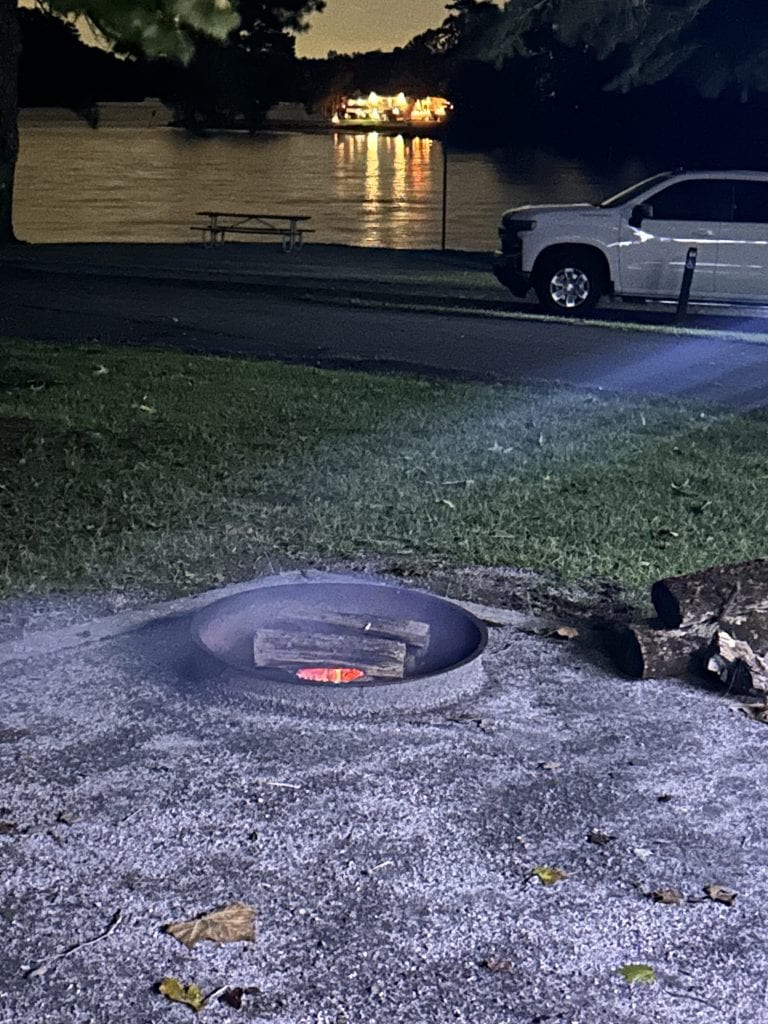
While it might be tempting to burn paper plates, food scraps, or even that mysterious leftover from the fridge, your fire pit isn’t a waste incinerator.
Some things don’t burn completely, and what’s left behind – half-melted plastics, greasy foil, half-cooked hot dogs – becomes someone else’s problem (and attracts critters).
If you toss something in the fire and it doesn’t turn to ash, it’s your job to clean it out before you leave.
We once rolled into a site and found melted aluminum cans, unburned paper towels, and a swarm of ants living their best life. Not exactly the rustic welcome we wanted.
5. Keep Your Campfire Safe and Supervised
There’s nothing better than sitting around a campfire but there’s nothing worse than realizing your neighbor left one burning… unattended.
If you’re walking away from your site, going to bed, or heading inside for an extended period, your fire needs to be completely extinguished. That means dousing it with water, stirring the ashes, and making sure it’s cool to the touch. Not just “it looks fine.”
Every year, wildfires are started because someone thought their fire was “probably out.” Don’t be that camper.
Campfires are one of the best parts of RV life just make sure you’re not the reason the fire department shows up.
6. Offer Help — Only If Absolutely Needed
We’ve all been there… watching someone try (and fail) to back into a site for the 5th time, their spotter waving wildly while shouting directions that clearly aren’t helping.
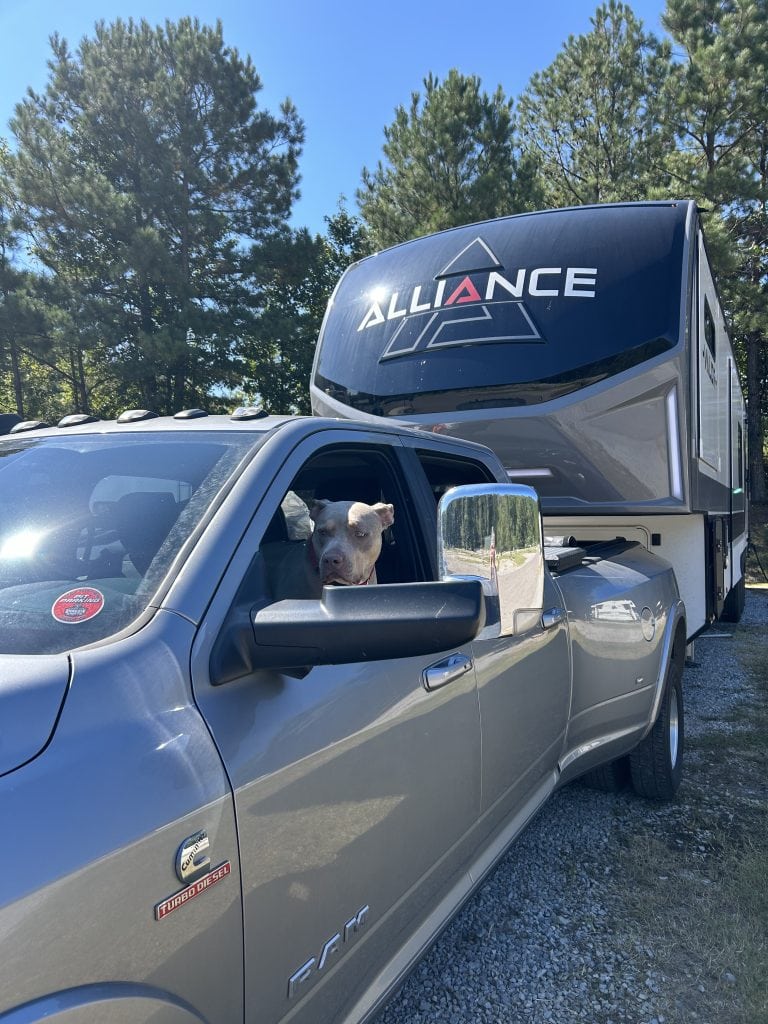
It’s tempting to jump in and take charge, but unless someone’s about to hit your rig or you’re specifically asked to help, it’s best to hang back.
We usually follow the “three-strike” rule: If someone has tried a few times and still looks flustered, we’ll walk over and ask, “Would you like a spotter?” But we never assume and we definitely don’t bark directions from across the loop.
Helping is kind. Hovering is not.
7. Give Campers Space to Set Up
When a new neighbor pulls in, it’s tempting to stroll over and say hello or offer unsolicited advice.
Resist. The. Urge.
Setting up camp, especially for first-timers, can be overwhelming, and even well-meaning interruptions can add to the chaos.
We typically wait until folks have leveled their rig, hooked up, and had a minute (or thirty) to breathe before saying hi if it seems like they’re open to chatting. Some campers love making new friends; others are just here for the peace and quiet.
8. Be Considerate When Departing Early and Arriving Late
Early birds and night owls both deserve a little peace. Whether you’re pulling in late or heading out at sunrise, be mindful that your neighbors might be winding down from a long day or trying to squeeze in a few more minutes of shut-eye.
If you’re arriving after dark, try to minimize noise and light. That means no slamming compartment doors, blaring headlights into someone’s window, or firing up a generator unless absolutely necessary.
On departure mornings, the same rules apply. Keep your voices low, music off, and try not to rev the diesel like you’re leaving pit row.
Ugh… we’ve been guilty of this one on a steep incline before… sorry, y’all!
RVers are generally forgiving but repeated 6 am departures with floodlights and backup beepers get old fast.
9. Turn Off Bright Outdoor Lights at Night
One of the best parts of RV camping? Actually seeing the stars.
Nothing kills that stargazing vibe faster than your neighbor’s porch lights blazing like a runway beacon all night long.
Most newer RVs come with bright LED exterior lights — porch lights, awning lights, motion sensors — and while they’re great for grilling or setting up after dark, they don’t need to stay on until morning.
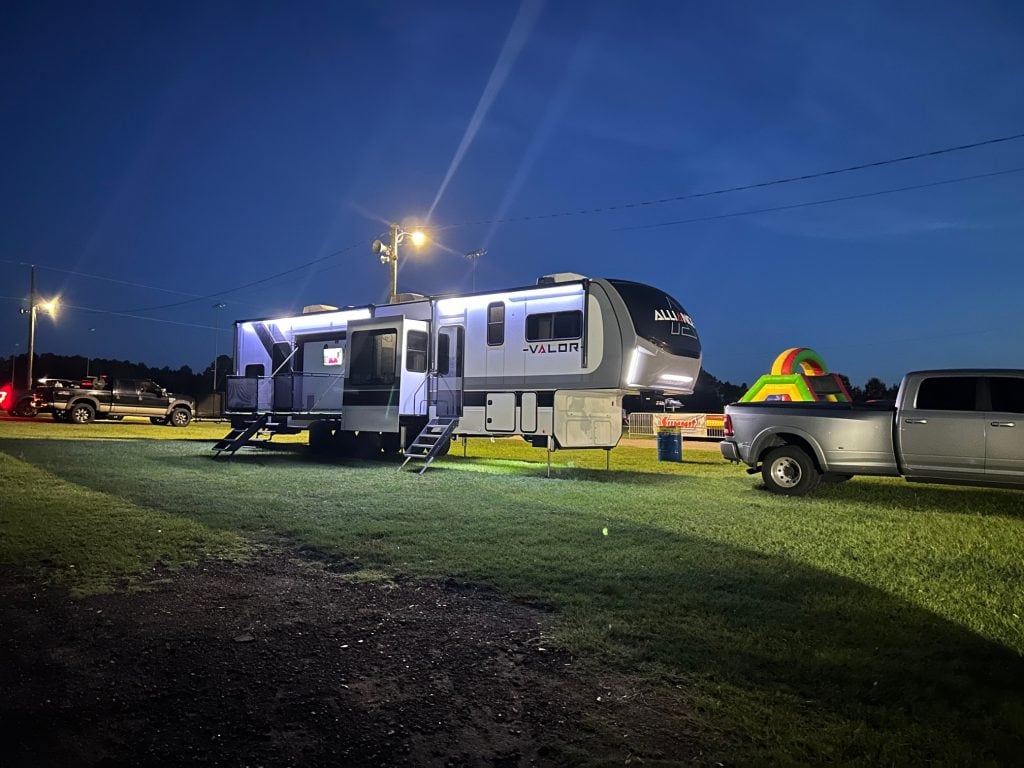
Once you head inside for the night, flip those switches off. Your neighbors (and the local wildlife) will thank you.
10. Be a Responsible Pet Owner
We love our pup Coco; she is part of our full-time travel crew and we wouldn’t hit the road without her. But even the sweetest fur-babies need rules, especially in a campground.
First and foremost: leash your pet.
Even if your dog is friendly, that doesn’t mean the neighbor’s dog (or kid) wants to meet them. Campgrounds usually have leash requirements for a reason: safety, comfort, and keeping the peace.
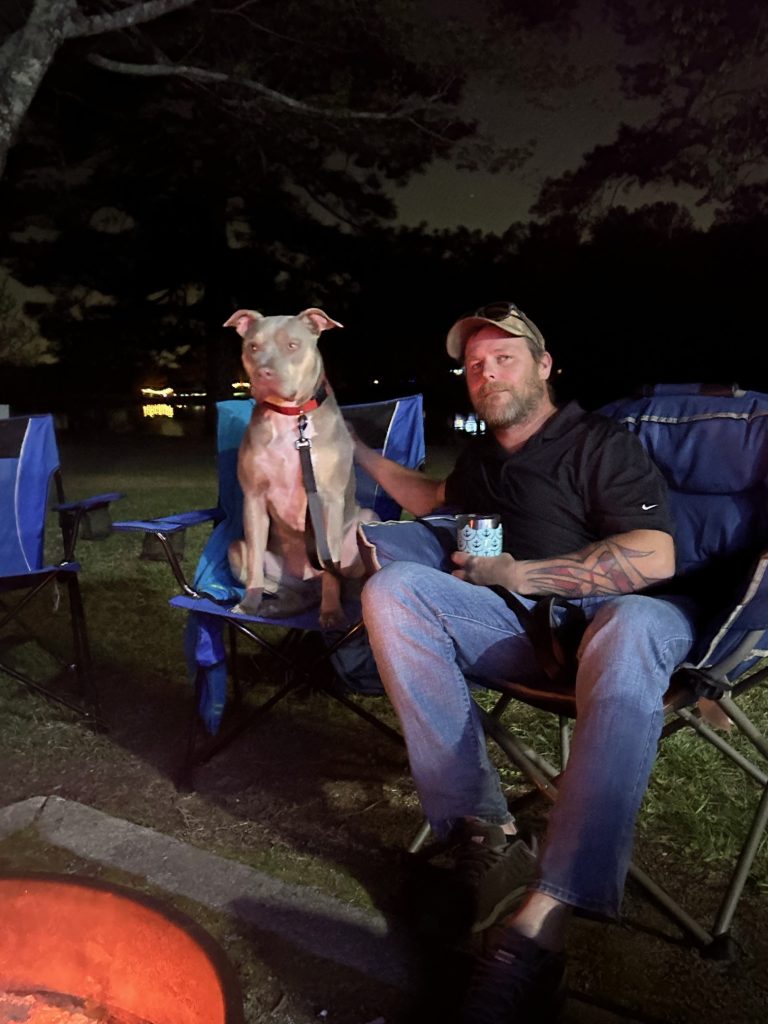
Second: pick up after your pet.
Always. No one wants to step in a surprise on their way to breakfast and nothing ruins a site faster than discovering “gifts” left behind in the grass.
Yeah, we know it’s gross… but it’s part of the deal.
Third: manage the barking.
We know that (most) dogs bark. But if your pup is howling every time a squirrel twitches or another camper walks by, it can make for a long weekend next door. Thin RV walls don’t offer much soundproofing.
Campgrounds are typically full of pet lovers… but we all appreciate it when fellow owners keep things clean, quiet, and respectful.
11. Generator Use = Be Thoughtful
Generators can be a lifesaver when you’re off-grid: powering AC, charging batteries, or, for those of you who treat coffee like oxygen, firing up the morning brew.
But if you’re using one at a campground, there’s a fine line between “practical” and “please make it stop.”
First, check the campground’s rules. Many have strict generator hours or don’t allow them at all. If they’re permitted, stick to the posted timeframes.
Second, consider placement.
If you’re using a portable generator, don’t set it up right next to someone else’s site (especially their picnic area or bedroom window). Try to angle the exhaust and sound away from others; even a few feet can make a big difference.
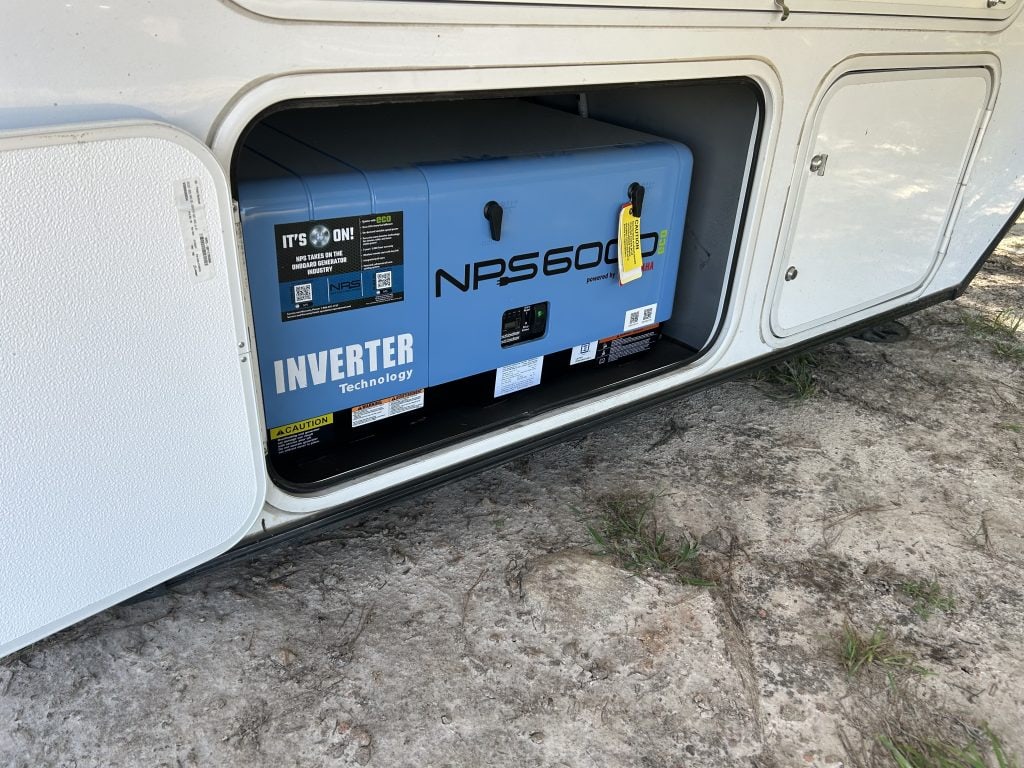
And if your RV has a built-in generator like ours, be mindful of when and how long you’re running it. No one wants to smell exhaust while they’re eating dinner outside.
12. Leave No Trace
This one should be obvious… but it isn’t always. When you pack up and roll out, your campsite should look like you were never there (or better).
That means:
- No trash in the fire pit (see rule #4)
- No broken gear left behind
- No bags of garbage “waiting for the morning run”
- And definitely no forgotten dog poop
Use the designated dumpsters and trash cans and double-check for rogue wrappers or bottle caps before you go.
Camping is about enjoying nature, not trashing it. So let’s all leave it just a little better than we found it.
13. Don’t Be That Smoker or Drinker
Let’s be real. Many campgrounds allow alcohol and smoking at least in designated areas. But just because you can, doesn’t mean you should do it in a way that turns your neighbors’ relaxing getaway into a secondhand-smoke-and-beer-fueled headache.
If you smoke, pay attention to the wind. Your Marlboro shouldn’t be drifting straight into someone else’s dinner. Step away from shared areas, and avoid lighting up where people (especially kids) are eating, relaxing, or just trying to breathe fresh air.
As for drinking: a cold beer around the fire? Totally fine.
Loud, slurred conversations at midnight? Not so much.
If alcohol turns you into a volume knob or an accidental campground philosopher, maybe it’s time to cap the night early.
You don’t have to be a monk… we certainly aren’t. Just read the room (or the loop) and be respectful.
14. Stay in Your Lane (Literally)
Your campsite comes with boundaries that are usually marked by gravel, posts, or utilities. It’s good manners to keep your setup inside them.
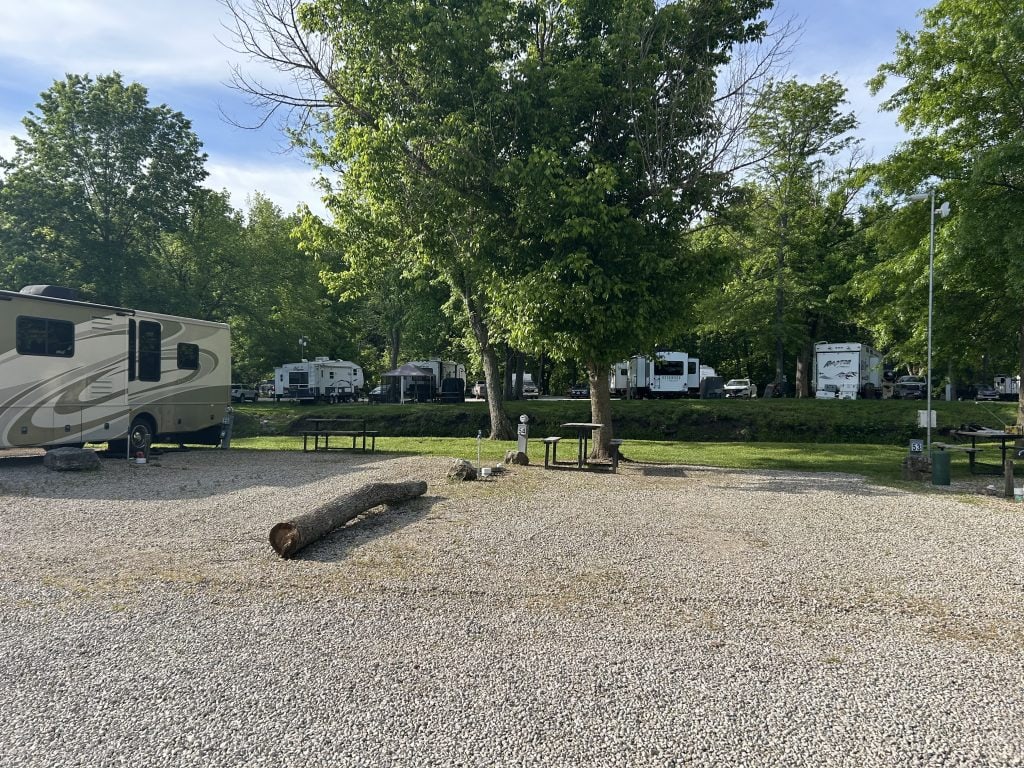
That means no slide-outs creeping into your neighbor’s space, no hammocks hung from their trees, and no kids’ bikes parked across the invisible line. We’ve seen awnings practically touching someone else’s rig… not a great way to make friends.
Everyone deserves room to breathe, move around, and enjoy their slice of nature without feeling boxed in by someone else’s gear explosion.
15. Don’t Park in Someone Else’s Site
It might seem harmless; the site looks empty, there’s no rig in sight, and it’s just right there. But unless you’ve paid for it or have permission from the campground, do not park in someone else’s site.
Here’s why: some RVers travel in Class B or Class C rigs and don’t have a separate vehicle to drive around town. If they want to grab groceries or go exploring, they’ve got to take their whole RV with them.
So that “empty” site? Yeah, it might still be occupied.
And even if no one shows up for a while, some campers check in after hours. Imagine rolling in at 9pm to find someone else’s truck parked where your RV is supposed to go… the site you already paid for.
It’s not just annoying, it’s disrespectful. If you need overflow parking or a temporary spot, ask the campground office. Don’t assume a “vacant” site is up for grabs.
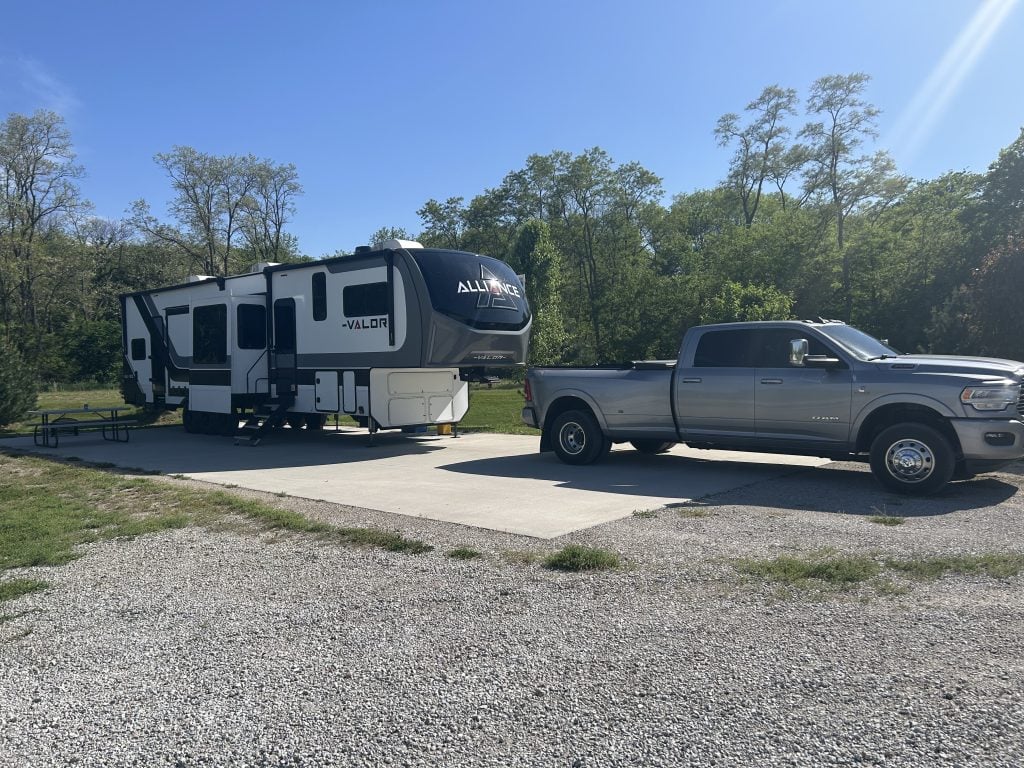
Bonus Tips for Being a Great Campground Neighbor
These aren’t full-blown etiquette rules, but they’re the kind of thoughtful touches that separate the rookies from the pros.
- Drive Slowly — Especially on Gravel Roads: Dust clouds aren’t fun for the folks sitting outside and kids or pets could dart into the road unexpectedly.
- Laundry Room Etiquette Matters: Don’t leave your clothes in the washer or dryer forever. Set a timer, switch them promptly, and make space for others.
- Be Ready at the Dump Station: This isn’t the time to reorganize your basement storage or take a phone call. Be prepped, be quick, and be gone… especially on Sunday mornings when the line is a mile long.
- Keep an Eye on Your Kids: RV parks are not a daycare. We love seeing kids outside having fun, but they need to respect other people’s space, stay safe, and follow campground rules just like the adults do.
A little consideration goes a long way. These small things might not be written in any rulebook, but they’re the kind of details your neighbors will remember.
Sign up for Our Weekly newsletter!
Keep It Respectful, Keep It Fun
Campground etiquette isn’t about being perfect, it’s about being thoughtful. Whether you’re a weekend warrior or starting your full-time RV journey, these unspoken rules help create the kind of campground experience we all want: peaceful, respectful, and just a little more neighborly.
We’ve learned a lot of this through trial, error, and a few “did-that-really-just-happen” moments. The good news? When you know better, you camp better.
If you’re still planning your first trip or brushing up before your next adventure, check out some things you need to know before you travel in an RV for even more road-tested advice.
New to RV Life? Here’s What to Read Next
If you’re just starting your RV journey, we’ve got more resources to help you hit the road with confidence:
- 👉 RV Essentials for Beginners – Gear you actually need (and what you can skip)
- 👉 How to Plan Your First RV Trip – A step-by-step trip planning guide
- 👉 Helpful RV Apps – Navigation, campgrounds, weather, and more
- 👉 Unwritten Rules of RV Etiquette – Don’t be that neighbor
- 👉 RV Travel Is the Best Way to Explore the US – In case you need a reminder of how awesome this life is
Whether you’re setting up for the first time or the fiftieth, we’re glad you’re here—and we’re always just a blog post away.
